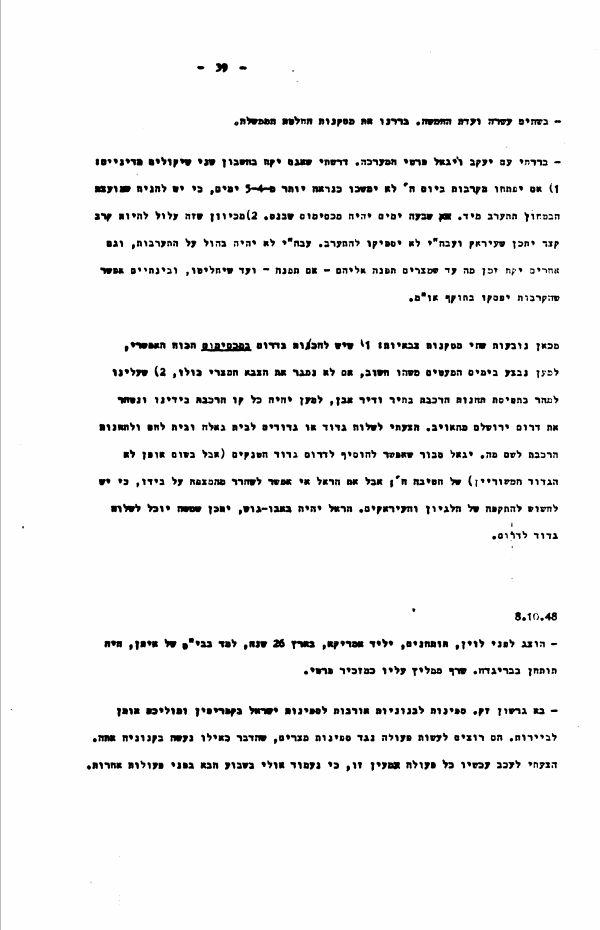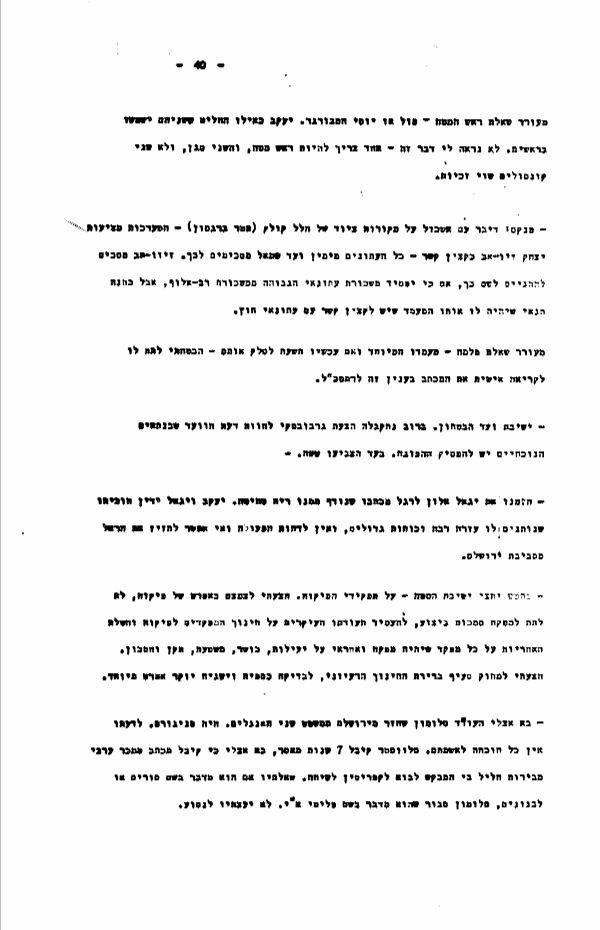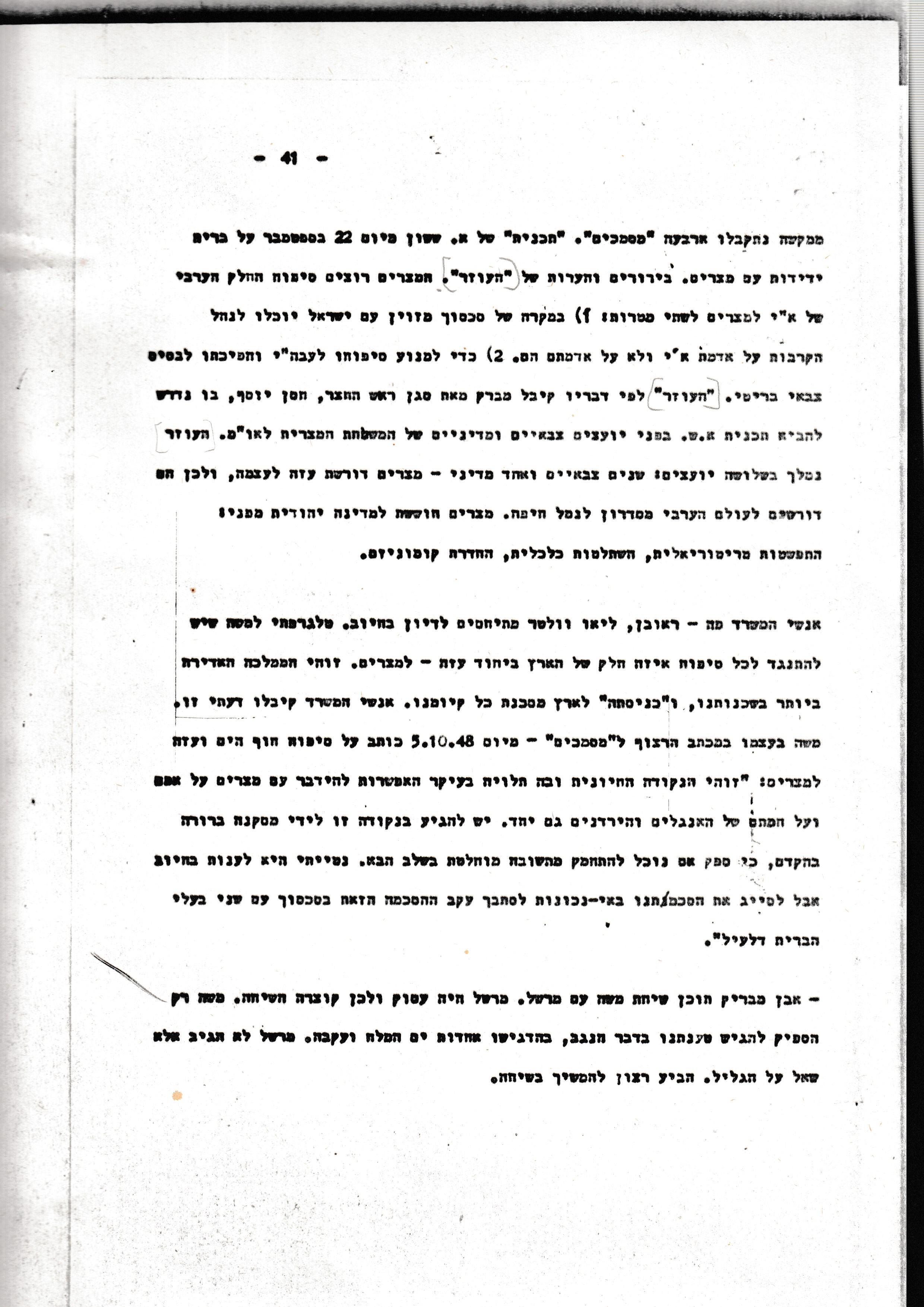1
of
Places:
Etan
United States
Beyrouth
Beirut
Har'el
Egypt
Barak
Dead Sea
Gaza
Rome
Jerusalem
Haifa
The use of the photograph is subject to the Copyright Law, 2007
07.10.1948
224878
[Friday,] October 8, 1948 I was introduced to [Yosef] Levin, from the Artillery [Corps], American-born, 26 years in the country, attended [Walter] Eytan’s school, was an artilleryman in the brigade. [Ze’ev] Sherf recommends him as a private secretary. – Gershon Zak came. Lebanese ships are ambushing Israel’s ships in Cyprus and taking them to Beirut. They want to launch an action against Egyptian ships, as apparently it [the Lebanese action] was done in collusion [with them]. I suggested postponing any action of this sort for now, because next week we may be facing other actions. [Zak] raises the question of the [navy’s] chief of staff – Paul [Shulman] or Yossi Hamberger [Harel]. Ya’akov [Dori] apparently decided that both of them will serve in the chairmanship. This doesn’t seem right to me – one needs to be chief of staff, and the other one deputy, rather than two consuls of equal rights [presumably a reference to ancient Rome]. – [David Zvi] Pinkas: [he] spoke with [Levi] Eshkol regarding Hillel Kook (Peter Bergson)’s sources of equipment. The [newspaper editorial] boards propose Yitzhak Ziv-Av as liaison officer [for local press] – all the newspapers, from the right to the left, agree to this. Ziv-Av agrees to enlist for this purpose, although he’ll lose his journalist’s salary, which is higher than a lieutenant general’s salary, but he poses the condition that he’ll have the same status as the foreign press liaison officer [Moshe “Moish” Pearlman]. [David Zvi] Pinkas raises the question of the Palmach – its special status, and whether this is the time to dismiss them. I promised to give him [a copy of my] letter to the chief of staff on this matter for his personal perusal. – Defense Committee meeting. Grabovsky [Meir Argov]’s proposal, that under the present conditions the truce should be terminated [for the sake of the operation in the south], [which was submitted] for the committee’s opinion, was accepted by a majority. Six voted in favor. – We summoned Yigal Allon because of his letter, which has the smell of blackmail. Ya’akov [Dori] and Yigael Yadin presented proof that he’s being provided with much assistance and large forces, and the operation shouldn’t be postponed and Harel cannot be removed from the vicinity of Jerusalem. – At 5:30 Staff meeting – on the inspector positions. I suggested reducing the inspection apparatus [organizational staff], not granting the inspector operational authority, basing his main certification on the education of commanders in inspection and placing the responsibility on each commander to be an inspector and responsible for efficiency, fitness, discipline, [adherence to] standard, and frugality. I suggested eliminating the provision on the assessment of ideational education; for financial and economic assessment a special apparatus will be established. – The attorney [Yaacov] Salomon [sp.], who returned from Jerusalem, from the trial of the two Englishmen, came to see me. He was their defense attorney. In his opinion there’s no proof of their guilt. Sylvester received a 7-year sentence. He came to see me, because he’d received a letter from an Arab acquaintance from Beirut, Khalil Bey, who’s asking to come to Cyprus to talk. I asked him whether he [Khalil Bey] is speaking on behalf of Syrians or Lebanese. Salomon thinks he’s speaking on behalf of Eretz-Israel refugees. I didn’t advise that he go. – Four “documents” arrived from Moshe [Sharett]: E. Sasson’s “plan” of September 22 regarding a friendship pact with Egypt, clarifications and comments by the [Egyptian] “assistant.” The Egyptians want to annex the Arab portion of Eretz Israel to Egypt for two purposes: 1) In the event of an armed conflict with Israel, they’ll be able to wage hostilities on Eretz-Israel’s land rather than their own land. 2) In order to prevent annexation by Transjordan, and its transformation into a British military base. The “assistant,” according to him, received a cable from the deputy chief of the court, Hassan Yusef [sp.], instructing him to present Eliahu Sasson’s plan to military and political advisors of the Egyptian mission to the UN. The assistant consulted with three advisors: two military [advisors] and one political [advisor] – Egypt is claiming Gaza for itself, and this is why they’re insisting on a corridor to the Haifa port for the Arab world. Egypt is concerned about a Jewish state because: territorial expansion, economic takeover, infiltration of communism. The [Foreign] Ministry personnel here – Reuven [Shiloah], Leo [Kohn], and Walter [Eytan] – view the discussion positively. I telegraphed Moshe [to say] that he should object to any annexation of any portion of the country, especially Gaza, by Egypt. This is the largest kingdom in our neighborhood, and its “entry” into the country threatens our entire existence. The Ministry personnel accepted my opinion. Moshe himself, in a letter attached to the “documents” – from October 5, 1948 – writes regarding the annexation of the coastline and Gaza by Egypt: “This is the crucial point, on which the possibility of discussions with Egypt primarily depend, in spite of opposition by both the English and the Jordanians. On this point [we] should reach a clear position soon, because it’s doubtful we’ll be able to avoid [having to give] a definitive answer in the next stage. My [Sharett’s] inclination is to answer in the affirmative, but to condition our consent on unwillingness to become embroiled because of this agreement in a conflict with the two above allies.” – [Abba] Eban cables the content of Moshe’s conversation with [Secretary of State] Marshall [on October 5]. Marshall was busy and therefore the conversation was cut short. Moshe only managed to submit our complaint regarding the Negev, emphasizing the unity of the Dead Sea and ‘Aqaba. Marshall didn’t respond, but instead asked about the Galilee. He expressed his wishes to continue the conversation.











